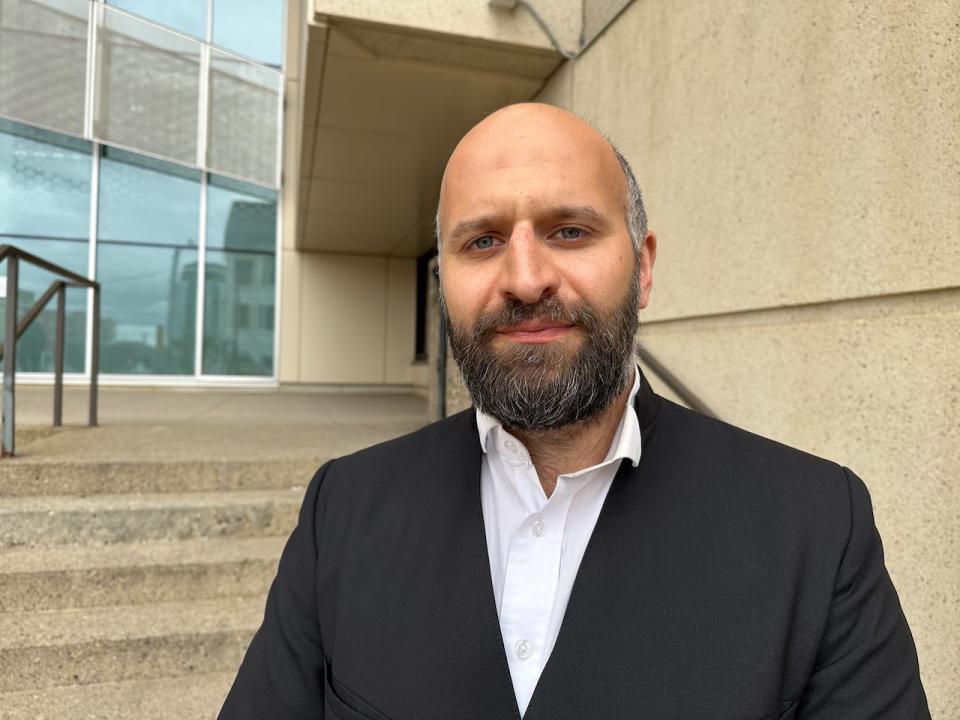2 men receive life sentences for Edmonton community hall shooting

Two men convicted of second-degree murder in the 2021 shooting death of a 22-year-old man at a south Edmonton community hall have been sentenced to life in prison.
One will be ineligible for parole for at least 17 years, the other for at least 20 years, a judge ruled Friday.
Last November, a jury found Abdullahi Yalahow and Christopher Wilson guilty of second-degree murder in the August 2021 death of Hamza Mohamed.
Yalahow was also found guilty of intentional or reckless discharge of a firearm. He and Wilson were each convicted of possessing a loaded prohibited or restricted firearm without authorization, licence or registration certificate.
The killing happened at Duggan Community Hall, near 37th Avenue and 106th Street, where 150 people were attending a cultural event.
A conviction for second-degree murder carries an automatic life sentence, with no chance of parole for between 10 and 25 years.
Delivering his sentence on Friday, Edmonton Court of King's Bench Justice Paul Belzil said Yalahow, 35, will be ineligible for parole for 17 years.
Wilson, 39, will be ineligible for parole for 20 years, the judge said.
What happened at the hall
Two surveillance systems captured the shooting on video.
Belzil said another event attendee, who fled the scene and is facing criminal charges, was the first to shoot Mohamed at 4:04 a.m. on Aug. 29, 2021.
Mohamed then fell to the floor and was unable to stand. Yalahow shot Mohamed while the 22-year-old was prone on the floor.
Mohamed, who had a gun of his own, then fired at Yalahow. The pair exchanged a number of shots, wounding each other.
As the exchange of gunfire was going on, Wilson punched Mohamed in the head. Mohamed dropped his gun.
Wilson picked it up and used it to shoot Mohamed four times. One of the bullets entered Mohamed's skull and killed him.
After shooting Mohamed, Wilson threatened to shoot a number of people in the hall.
Belzil said Wilson's moral culpability was higher than Yalahow's.
"Wilson executed a defensive, wounded individual who no longer posed a threat to anyone, including Yalahow," he said in his oral decision on Friday.
The judge said the use of firearms was "nothing short of outrageous" and displayed complete disregard for the partygoers' safety.
Both Yalahow and Wilson had lengthy criminal records and were under lifetime handgun prohibitions at the time.
Yalahow declined to speak at sentencing. Wilson, who told the court he was too drunk to remember the night's events, apologized to the victim's family.
Jurors had recommended parole eligibility between 20 and 25 years for Yalahow and Wilson.
The Crown sought life sentences with no parole for 22 years for both men.
Zachary Al-Khatib, Yalahow's defence lawyer, sought parole eligibility after 14 years for his client.
Matthew Ackerman, who represented Wilson, sought parole eligibility after 15 years.
Outside court, Al-Khatib told reporters that Belzil recognized his client had a disturbed upbringing. Yalahow grew up in poverty and was separated from his parents in Somalia during the civil war there.
"I think that factored into his decision," the lawyer said.
In a victim impact statement read in court earlier this week, Naima Hussein said Mohamed, her cousin, was "a charismatic, gentle and kind soul who was bursting with goals and aspirations."

Zachary Al-Khatib, Yalahow's defence lawyer, said he thought the judge factored his client's difficult upbringing into the sentencing decision. (Madeleine Cummings/CBC)


